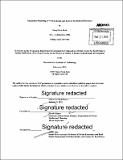| dc.contributor.advisor | David Geltner. | en_US |
| dc.contributor.author | Jeon, Sang Hoon | en_US |
| dc.contributor.other | Massachusetts Institute of Technology. Center for Real Estate. Program in Real Estate Development. | en_US |
| dc.coverage.spatial | n-us--- a-kr--- | en_US |
| dc.date.accessioned | 2015-07-31T19:08:23Z | |
| dc.date.available | 2015-07-31T19:08:23Z | |
| dc.date.copyright | 2015 | en_US |
| dc.date.issued | 2015 | en_US |
| dc.identifier.uri | http://hdl.handle.net/1721.1/97961 | |
| dc.description | Thesis: S.M. in Real Estate Development, Massachusetts Institute of Technology, Program in Real Estate Development in conjunction with the Center for Real Estate, 2015. | en_US |
| dc.description | Cataloged from student-submitted PDF version of thesis. | en_US |
| dc.description | Includes bibliographical references (pages 92-93). | en_US |
| dc.description.abstract | Situated in the middle of the capital stack of a property, mezzanine financing in real estate has been established in the form of B-notes, mezzanine loans and preferred equity, allowing the borrower to reduce its equity investment. Emerged in the early 2000's, the US real estate mezzanine market has rapidly expanded mainly due to the credit crunch following the Global Financial Crisis that widened the funding gap between the senior debt and the borrower's equity and, thereby, opened investment opportunity for mezzanine lenders to fill the gap. Meanwhile, major Korean institutional investors, categorized into pension funds, mutual aid associations, life insurers and a sovereign wealth fund, had increasingly invested in foreign real estate, particularly in the form of equity investments in order to enhance investment returns and diversify their portfolio. As asset prices are approaching the pre-crisis level, however, they have started invested in debt products instead of equity investment, focusing on mezzanine debt mainly in the US and UK markets. The purpose of this thesis is to identify the mezzanine investment opportunity in the US real estate market for Korean institutional investors. The US real estate mezzanine investment section introduces the elements of the mezzanine market and investigates the emergence and evolution of the market and specific investment strategies through publication review and an open-ended interview with a US investment manager. The Korean institutional investor section introduces the profile of major Korean institutions and looks into the market environment that led them to move toward debt away from equity and to prefer mezzanine debt for their overseas real estate investments through market research and open-ended interviews with major Korean asset managers. This thesis ends with defining mezzanine investment opportunity and risk in the US real estate market for Korean institutional investors. After a thorough research, it is found that the US mezzanine market is expected to keep creating investment opportunity as long as the funding gap exists. Also, the research makes it clear that mezzanine debt commands higher returns compared to levered equity investment, drawing Korean institutions who pursue higher risk-adjusted returns while avoiding equity investment due to compressing cap rates. As being most advanced, experienced, established and biggest, the US mezzanine market can be the best target market for Korean institutions. However, they have to take into account the current issues of diminishing premium on mezzanine debt and increasing default risk. | en_US |
| dc.description.statementofresponsibility | by Sang Hoon Jeon. | en_US |
| dc.format.extent | 97 pages | en_US |
| dc.language.iso | eng | en_US |
| dc.publisher | Massachusetts Institute of Technology | en_US |
| dc.rights | M.I.T. theses are protected by copyright. They may be viewed from this source for any purpose, but reproduction or distribution in any format is prohibited without written permission. See provided URL for inquiries about permission. | en_US |
| dc.rights.uri | http://dspace.mit.edu/handle/1721.1/7582 | en_US |
| dc.subject | Center for Real Estate. Program in Real Estate Development. | en_US |
| dc.title | Mezzanine financing in US real estate and Korean institutional investors | en_US |
| dc.title.alternative | Mezzanine financing in United States real estate and Korean institutional investors | en_US |
| dc.type | Thesis | en_US |
| dc.description.degree | S.M. in Real Estate Development | en_US |
| dc.contributor.department | Massachusetts Institute of Technology. Center for Real Estate. Program in Real Estate Development. | en_US |
| dc.contributor.department | Massachusetts Institute of Technology. Center for Real Estate | |
| dc.identifier.oclc | 913891166 | en_US |
